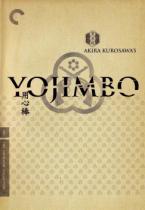Yojimbo
 Year:
Year: 1961
Film Studio: Toho
Genre: Action, Classic
Length: 111 Min.
DirectorAkira Kurosawa (1910)
WritingAkira Kurosawa (1910)...Story By
Akira Kurosawa (1910)...Screenwriter
Ryûzô Kikushima...Screenwriter
ProducerRyûzô Kikushima
Akira Kurosawa (1910)
Tomoyuki Tanaka (1910)
CinematographerKazuo Miyagawa (1908)
MusicMasaru Satô (1928)...Composer
StarsToshirô Mifune (1920) as Sanjuro Kuwabatake / The Samurai
Tatsuya Nakadai (1932) as Unosuke, gunfighter
Yôko Tsukasa (1934) as Nui
Isuzu Yamada (1917) as Orin
Daisuke Katô (1910) as Inokichi, Ushitora's rotund brother
Seizaburô Kawazu (1908) as Seibei, brothel operator
Takashi Shimura (1905) as Tokuemon, sake brewer
Hiroshi Tachikawa as Yoichiro
Review Clint Eastwood became an international star playing a nameless wandering gunfighter who supplants himself into situations where his bravado and his prowess with weapons help him to defeat corrupt and greedy adversaries. His
‘man with no name character’ was lifted almost completely intact from a film by acclaimed Japanese director Akira Kurosawa. In
Yojimbo we are introduced to a ronin named Sanjuro, (which would aptly name the sequel to this very successful film) a disillusioned, wandering samurai who uses his wits to keep his belly full and to uphold the bushido code.
After decades of civil war, the class system has broken down and through lost wars and battles he finds himself a ronin, that is, without allegiance to any clan. One day when he reaches a fork in the road, he decides to let the winds of fate guide him in his further travels. He tosses a stick in the air and the direction it points to when it lands is the path that Sanjuro decides to follow. He comes upon what appears to be a quiet town, yet he finds out that looks are deceiving, as he realizes that he has stumbled into a town that’s fighting its own private civil war. Two factions of Yakuza are fighting for control and both are building up their forces to insure the elimination of the other. Sanjuro decides that both parties are destroying the town and after proving his worth by cutting down three henchman of one faction, decides to sell his services to the highest bidder. What both groups fail to realize is that Sanjuro is playing from both sides of the deck, and is using his wits to out maneuver each faction and slowly whittling away at the core strength of both groups.
Yojimbo is Akira Kurosawa’s most accessible film in that it plays like an American western, the only difference being that the cast brandish swords instead of guns. The final climactic battle is structured similarly to the atypical western shootout as both parties approach each other cautiously on the dusty, windswept main street. What makes
Yojimbo so successful are the acting skills of Toshirô Mifune, who comes across as a combination of Gary Cooper, John Wayne and Laurence Olivier all wrapped up in a scratching, tattered package. This would be the role that would forever be associated with Mifune and would be the model for the famous samurai sketches of John Belushi on
Saturday Night Live. If you are new to the world of Akira Kurosawa and Toshirô Mifune you have found a good film to get yourself started, it is one of Kurosawa’s most approachable and entertaining films.
Review Criterion5 Stars - The pinnacle of film perfection and excellence.4 ½ Stars - Not quite an immortal film, yet a masterpiece in its own right.
4 Stars - Historically important film, considered a classic.
3 ½ Stars - An entertaining film that’s fun or engaging to watch.
3 Stars – A good film that’s worth a Netflix venture.
2 ½ Stars - Borderline viewable.
2 Stars – A bad film that may have a moment of interest.
1 ½ Stars – Insipid, trite and sophomoric, and that's its good points.
1 Star – A film so vacuous, it will suck 2 hours from the remainder of your life.
½ Star - A gangrenous and festering pustule in the chronicles of celluloid.